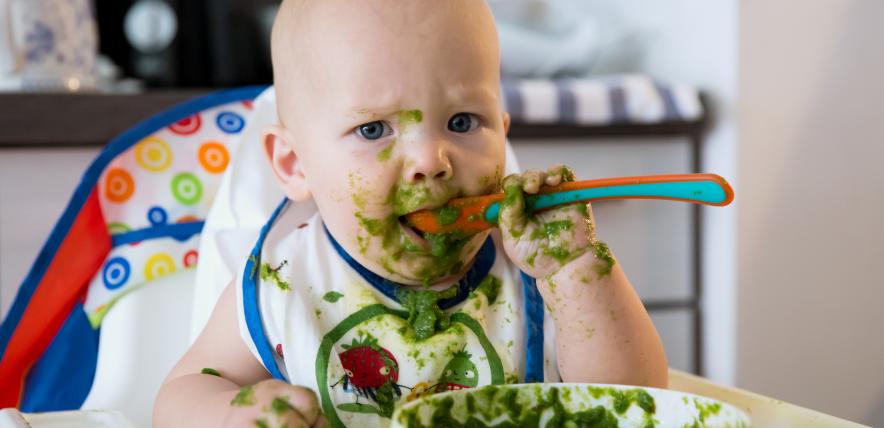Start them early
As adults we all know the guidance about eating ‘five a day’. But trying to convince a small child is harder, and many of us struggle to get our children to eat any kind of vegetable.
The key to getting your little one to eat a healthy, balanced diet is to introduce vegetables early, says Judy More, a paediatric dietician. “It very much depends on the child but generally the earlier you give them vegetables, the better, and this means starting early in weaning.”
Carrots, sweet corn and peas are naturally sweet, so tend to be a favourite with small children. But most other vegetables can also be introduced early on. During weaning give vegetable sticks as fingers food as well as including them in cooked, mashed food.
“Some children find some vegetables bitter in taste, or they might not like the texture. Generally, roasting them in a little oil or stir-frying tends to make them less bitter. Similarly, if you’re giving them a salad, then use a little bit of dressing,” Judy says.
Parents who have not already introduced a range of flavours by the time their child is 10-12 months old might find it harder to encourage them to eat vegetables.
“During their second year most toddlers begin to want everything to be familiar, so giving them something new to eat might be difficult. But that is not to say they won’t eat vegetables in time, so parents should try to be patient and to persevere,” Judy adds.
Aim for balance
At this age, there is no single type of food that children need, but a balanced diet is essential for growth and energy. There are five main foods groups that provide the nutrients your child needs:
- Bread, rice potatoes, pasta and other starchy foods such as breakfast cereals.
- Fruit and vegetables, including fresh, frozen, tinned and dried. Offer these at every meal-time so you child learns they are always part of their lunch or dinner. Fruit and vegetable should make up about a third of the total amount of food eaten by children.
- Milk, cheese and yogurt, for calcium, vitamin A, riboflavin and iodine along with some protein.
- Meat, fish, eggs, nuts and pulses, which provide protein, iron and zinc as well as whole variety of mineral and vitamins.
- Foods high in fat and sugar. Small amounts are enough and they provide omega 3, six fats and vitamins A & E.
If your child refuses to eat vegetables during meal-times try to stay calm. Coercion often doesn’t work, and getting stressed won’t help as your child might come to dread meal-times and see them as a time of conflict. Instead, try to make lunch and dinner into fun family occasions with lots of chatting and offer praise for what they do eat. Taking your child shopping, to look at different types of vegetables and talking about what they taste like, might encourage him or her to want to try them. Or you could turn it into a game and choose a new vegetable to try every week.
Show them how it's done
Trying to disguise vegetables in food or bribing children with treats, such as a pudding or sweets, in return for eating their greens is also not advised. “This can devalue the vegetable as an important food in itself. Instead, be a good role model and eat whatever you’ve given your child yourself,” Judy adds. “Children like to copy at this age, so it’s a great time to give them good messages about healthy eating.”
“Don’t worry if they try to feed you or take vegetables from your plate. This is their way of experimenting with food, and they will respond to you setting a good example. When you’re eating together mention how sweet and crunchy, or what a lovely colour, the vegetable is.”
“Try not to transfer your own dislike for particular foods on your child. Just because we, as parents, don’t like something it doesn’t mean a child won’t.”
Further Information
http://www.infantandtoddlerforum.org/
http://www.nhs.uk/Livewell/5ADAY/Pages/Family.aspx
Written for the Early Years Alliance by Dorothy Lepkowska.







